Tour the tunnels below Cleveland’s Soldiers’ and Sailors’ Monument
by Jean-Marie Papoi
May 3, 2022
Category: NE Ohio Neighborhoods and Their History
CLEVELAND: AN HISTORICAL OVERVIEW from Encyclopedia of Cleveland History (1987)
From Encyclopedia of Cleveland History (1987)
CLEVELAND: AN HISTORICAL OVERVIEW
Editor’s Note: This text comprises the preface to the first printed edition (1987) of the Encyclopedia of Cleveland History and as such its history of the city ends in 1987. It was written by several historians who had extensive expertise in the city’s history for different time periods. Robert Wheeler of Cleveland State University (1796 to 1860 section); Robert Weiner of Cuyahoga Community College (1861-1929 section); and Carol Poh (Miller) (1931 to 1980s section).
Cleveland’s 50 Most Important Moments of the Past 50 Years – Cleveland Magazine, April 2022
African Americans built a tiny enclave on the outskirts of toney Chagrin Falls: Black History Month
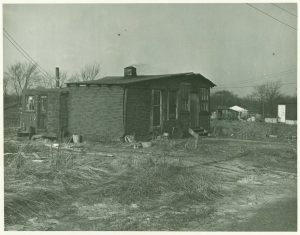
African Americans built a tiny enclave on the outskirts of toney Chagrin Falls: Black History Month
by Brenda Cain, Plain Dealer Feb 7, 2022
The link is here
Justin Bibb Wins. To Become New Mayor of Cleveland – November 2, 2021

Cleveland voters elected Justin Bibb as the city’s next mayor by a substantial margin Tuesday night. [Nick Castele / Ideastream Public Media]
Justin Bibb elected mayor of Cleveland in resounding victory over Kevin Kelley by Lee Chilcote, The Land Nov 2, 2021, click here
After Jackson, Ideastream by Nick Castele (podcasts and articles), click here
Cleveland Mayor Frank Jackson is retiring, and for the first time in 16 years, City Hall is getting a new leader. What do the seven candidates offer? What do voters want? Host Nick Castele goes on the campaign trail in “After Jackson: Cleveland’s Next Mayor” from Ideastream Public Media.
Justin M. Bibb was elected mayor of Cleveland on Tuesday, paving the way for a handoff of power between the city’s longest-tenured leader and a 34-year-old newcomer who promised a fresh start. by Nick Castele and Taylor Heggerty, Nov 3, 2021 click here
Justin Bibb has defeated City Council President Kevin Kelley in the 2021 Cleveland mayoral election and will succeed four-term incumbent Frank G. Jackson. by Sam Allard, Cleveland Scene Nov 3, 2021. Click here
Justin Bibb’s really big thing in a Cleveland election that was all about change: Brent Larkin, Nov 7, 2021. Click here
CLEVELAND — On the day after his life changed forever, Cleveland’s next mayor got a glimpse of his future.
As well-wishers paraded by his lunch table at the Diner on 55th, one stopped to offer a kindly hug and quiet prayer. The Rev. Stephen Kosinski, a priest at St. Stanislaus Church in the Fleet Avenue neighborhood, had never met Justin Bibb, but knew what had just happened to him.
“Bless you,” Father Kosinski said softly.
He’ll need it.
Not a whole lot in Bibb’s 34 years has prepared him for the task ahead. But that mattered not at all to nearly 63% of those who bothered to cast ballots in Cleveland’s mayoral election. To them, Bibb was tomorrow’s candidate. His opponent, the experienced Council President Kevin Kelley, was yesterday’s.
This had been clear since the Sept. 14 primary election, when Bibb ran first and beat down former Mayor Dennis Kucinich in West Park, the city’s biggest voting neighborhood. Cleveland politics is changing, probably for the better.
Kelley and his campaign team never figured it out. Team Bibb outhustled and outthought their opponent at every turn. The result was an epic beatdown, maybe the most remarkable win I’ve seen in nearly 52 years of paying attention to these things. At least the equal of Michael White’s dramatic Cleveland mayoral win 32 years ago. (Note: White also saw this coming).
Bibb is smart and personable. On paper, Kelley was much more qualified. But Bibb and his campaign’s two strategists, Ryan Puente and Bill Burges, took the risk that white voters, especially young ones, might be willing to look past the city’s tired old history of racial politics and support someone who promised change.
Maybe they were lucky. Maybe they were visionaries. What we know for certain is they were right. On Nov. 2, Clevelanders who bothered to participate in the democratic process voted overwhelmingly to break from the past. Kelley got beat in parts of the West Side he would have won in a landslide if he’d been running 40 years ago against a Black opponent.
It was no better for Kelley east of the Cuyahoga, where the council president’s supporters thought Bibb’s lack of support from Black councilmen would limit the size of his win. It should have been clear that support for Bibb from nearly 80 Black ministers mattered infinitely more. It was another mind-numbing miscalculation, as Bibb crushed Kelley everywhere on the East Side, especially in the vote-rich southeast part of Cleveland, where Bibb’s defeated mayoral primary election rival Zack Reed worked indefatigably on the winner’s behalf.
But Bibb had an unwitting ally in all this. For months, Mayor Frank Jackson delayed announcing whether he would run for a fifth term, leaving in the lurch Kelley and another potential candidate, Councilman Blaine Griffin. While Kelley waited, Bibb campaigned tirelessly,
Back then, few took Bibb seriously. And some who later supported him dismissed Bibb as a lightweight.
“I was running by myself for five months,” said Bibb, with genuine astonishment. “I might not have won without that.”
Kelley got into politics for the right reasons. If he’s bitter about how Jackson hurt him, he has reason to be. The mayor’s dithering was selfish and wrong.
Bibb will be the least experienced mayor in the city’s history. To that, a huge majority of the voters collectively replied, “So what?”
So now it’s time to shelve concerns about his resume and youth, time to give him a chance to govern with creativity. I’m not sure the people who didn’t see this coming deserve a seat at the table, though Bibb will probably graciously give them one, anyway.
Sure, Bibb’s inexperience makes this a bit of a “hold your breath” moment. But those who worry Bibb will surround himself with other newcomers are probably mistaken.
“We will hire smart people, young and old, with diverse sets of experiences,” he told me. “And I am going to be thoughtful and deliberative about the entire process.”
Bibb’s election represents a historic change in the way people in the city vote. It doesn’t mean he’ll be a great mayor. It does mean he did a great thing.
Brent Larkin was The Plain Dealer’s editorial director from 1991 until his retirement in 2009.
Mayoral quiz: On the eve of electing a new Cleveland mayor, test you knowledge on our past mayors
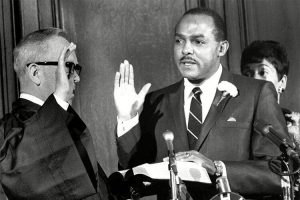
Cleveland Mayor Carl Stokes- Britanica
Mayoral quiz: On the eve of electing a new Cleveland mayor, test you knowledge on our past mayors
by Grant Segall, Freshwater Cleveland
The Guardians Of Traffic from Western Reserve Historical Society
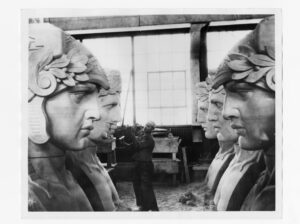
By: Pamela Dorazio Dean
WRHS Curator of Italian American History / Director, IAMCLE
Preschool and Early Child Education forum Jan 30, 2020 at Shaker Hts Public Library
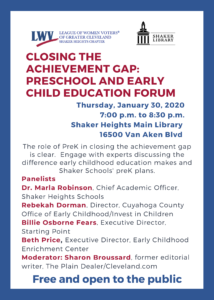
Preschool and Early Child Education forum
Thursday, January 30, 2020 7:00 p.m. to 8:30 p.m.
Shaker Heights Public Library Main 16500 Van Aken Blvd 44122
The forum write up by Julie Hullett is here
The flyer is here
The video is here
The role of PreK in closing the achievement gap is clear. Engage with experts discussing the difference early childhood education makes and Shaker Schools’ preK plans.
with panelists:
Rebekah Dorman, Director, Cuyahoga County Office of Early Childhood/Invest in Children
Billie Osborne Fears, Executive Director, Starting Point
Dr. Marla Robinson, Chief Academic Officer, Shaker Hts. Schools
Beth Price, Executive Director, Early Childhood Enrichment Center
moderated by Sharon Broussard, Former editorial writer, The Plain Dealer/Cleveland.com
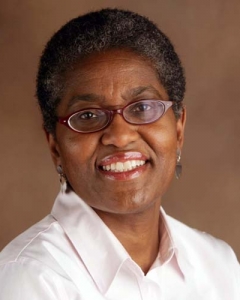
Sharon Broussard
Cosponsored by Shaker Heights Public Library and the League of Women Voters Greater Cleveland- Shaker Hts. Chapter
“Experts say state needs bail reform” by Julie Hullett
Summary of “Bail Reform” forum held at Cleveland Hts/University Hts Public Library on Thursday December 12, 2019
Experts say state needs bail reform
By JULIE HULLETT
The pdf is here

left to right: Nick Castele- Ideastream, Claire Chevrier ACLU Ohio, Judge Charles L. Patton Jr., Cleveland Municipal Court, Judge John J. Russo, Cuyahoga County Common Pleas Court
CLEVELAND HEIGHTS — Panelists at a Thursday forum concluded that the state of Ohio is in desperate need of bail reform, a slow yet necessary process to even the scales as defendants stand before the justice system.
The Greater Cleveland Chapter of the League of Women Voters sponsored the event at the Cleveland Heights-University Heights Public Library on Dec. 12, in addition to other sponsors such as Case Western Reserve University Siegal Lifelong Learning, Heights Public Library, Ideastream and First Interstate Properties, Ltd.
Nick Castele of WCPN/Ideastream moderated the panel, which consisted of advocacy counsel for the American Civil Liberties Union of Ohio Claire Chevrier, Cleveland Municipal Court Judge Charles Patton, Jr. and Cuyahoga County Common Pleas Court Administrative and Presiding Judge John Russo.
“In Ohio, we have a two-tier system of justice in which wealthy individuals who were assigned cash bail as a condition of release get to go home to their families,” Ms. Chevrier said. “Those who don’t have deep pockets and can’t pay for their cash bail as a condition of release stay in jail.”
The video from the forum is here:
Pretrial services
Judge Patton said that Cleveland did not have a pretrial services department two years ago. A representative from pretrial services greets people in custody directly after their arrest and gathers information such as their employment and housing status. Judge Patton said that a risk assessment tool is used to determine if the person is a risk to the community and the pretrial services department gathers that information.
He said that there are currently 90 people in Cleveland Municipal Court jail. Several years ago, there was an average 200-300 people in jail on any day, according to Judge Patton.
“During this year, we have reduced our jail population by more than 50 percent by utilizing the pretrial services,” he said.
Risk assessments
Ms. Chevrier said that risk assessments cannot be objective. Although some are better than others, she said, risk assessments are based on underlying biases and criminal policing. For example, some assessments would flag defendants who live in a high crime neighborhood, which Ms. Chevrier said is criminalization of poverty. Other biases include number of former arrests and convictions, which can have racially disparate outcomes, she explained.
“There’s a lot of coercion under cash bail system,” she said. “That is not an objective measure.”
Closing the gap
Judge Russo explained how Cuyahoga County Common Pleas Court works in coordination with Cleveland Municipal Court. He said that 60 percent of the felony charges in the common pleas court come from the 13 municipal courts in the county. The county court must manage 15,000 to 17,000 cases per year, he said.
Six years ago, Judge Russo said that defendants waited an average of 30 days in jail between appearing in front of the municipal court and the county court. He said that the gap is now four days because dire consequences come from being stuck in jail.
“We closed that gap for a number of reasons…[like] how it can affect someone’s life in a matter of three days, losing a car, a job, a home, whatever it might be,” Judge Russo said.
Moving forward
Judge Russo was a member of the Supreme Court of Ohio’s task force on bail reform and the group published nine recommendations, including requiring a risk assessment tool and the presence of counsel for an initial appearance, considering alternatives to pretrial detention and use text or email reminders for court dates, according to the report.
Judge Russo said that Ohio needs a “centralized data-based system for criminal justice system” so every region of the state can collect and compare data equally. Judge Patton compared the costs of keeping people in jail or releasing them until their next court date.
“We are spending between $100-150 per night per defendant in jail,” Judge Patton said. “We are spending less than $10 for every night they’re on the street.”
Ms. Chevrier and the ACLU are advocating for “a presumption of release” unless the judge or prosecutor asks for a hearing because they notice something concerning in the facts of the case or the person’s history that could make the person a public safety risk.
Audience members and mental health professionals Dr. Megan Testa and Annette Amistadi said that the forum was informative. Dr. Tetsa of Shaker Heights, a psychiatrist at University Hospitals, said that she often works will patients who are mentally ill and need treatment rather than jail time. Ms. Amistadi of Parma said that she came to the forum to learn more about how the justice system can treat people fairly and work as efficiently as possible.
Shaker Candidates Forum, Thursday, September 26, 2019 7:00pm

The School Board video is here
The Mayoral video is here
The flyer is here
Shaker Candidates Forum

